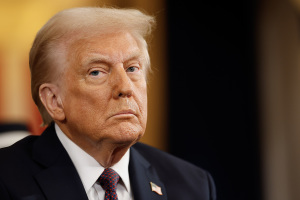'In God We Trust' Marks 50th Anniversary Amid Controversy
After 50 years of appearing on the back of U.S. dollar bills, the words "In God We Trust" continue to be at the center of debate with some courts examining whether references to God in the public sphere violates the Constitution's separation of church and state.
In Indiana, the American Civil Liberties Union is waging a legal battle over the state's "In God We Trust" license plates, which now appear on over one third of all passenger cars statewide since its introduction at the beginning of this year, according to the state's Bureau of Motor Vehicles.
One highly spotlighted case in 2006 involved atheist Michael Newdow, who asked the 9th U.S. Circuit Court of Appeals to declare "In God We Trust" a violation of the First Amendment, which prohibits the establishment of a state religion. Newdow has also unsuccessfully fought to have courts strip "under God" from the Pledge of Allegiance.
While some court cases don't directly attack the four-word phrase, also the nation's current motto, they have challenged other evocations of God that appear throughout America's legal and education systems – from the reciting of "under God" in the Pledge of Allegiance to posting the Ten Commandments in courthouses.
Critics often argue that references of God in public domains exclude faith groups that don't believe in God and amount to the government's endorsement of religion, in particular Christianity.
Despite their objections, many Americans see the "In God We Trust" motto and other official evocations of a creator as a reflection and acknowledgement of America's rich religious heritage, according the Pew Forum for Religion & Public Life.
"Because this country was founded by Christians – some of whom were escaping religious prosecution – the reference to God is part of the history of this country," said Judge Roger Bradford of the Porter Superior Court in Indiana, according to The Times of Northwest Indiana.
"I think they get a little picky when they want to remove all references to it. You can turn the argument around and say that to have no recognition of a supreme being would favor atheists," he added.
Jay Sekulow, chief counsel of the conservative American Center for Law and Justice, also supported the retention of the motto.
"It reflects the heritage of the country," said Sekulow, according to the Religion News Service. "It's something the founding fathers recognized, that our rights and liberties were endowed by a creator. You recognize the source of these rights."
A 2003 Gallup poll found that an overwhelming 90 percent of Americans approved of the use of the motto on coins. A separate Gallup poll in 2004 reported that a similar majority agreed to keeping the words "under God" in the Pledge of Allegiance.
Supporters of the disputed phrase have also launched their own legal battles to have "In God We Trust" displayed in public institutions and arenas.
In Bakersfield, Calif., a board trustee of the Kern High School district is spearheading an effort to put up a poster reading "In God We Trust" in every classroom in the district. The board was scheduled to meet Monday night.
Last year, Governor Jeb Bush signed a House Bill led to Florida adopting the phrase as the official state motto.
The decision to place the phrase on America's currency can be traced back to two major times of crisis in the nation's history. The phrase, now also the nation's motto, was commissioned back in the Civil War era by Secretary of the Treasury Salmon P. Chase upon the urging of the American public, including a church minister.
In a letter, Chase instructed the Director of the Mint at Philadelphia to prepare a motto, writing, "No nation can be strong except in the strength of God, or safe except in His defense. The trust of our people in God should be declared on our national coins."
"In God We Trust" began appearing on coins in 1864.
At the height of the Cold War, when the U.S. faced the threat of atheistic communism, the phrase made its way onto paper currency, appearing first on Oct. 1, 1957. The move came one year after a joint resolution passed by the 84th Congress declared "In God We Trust" the national motto of the United States.





























